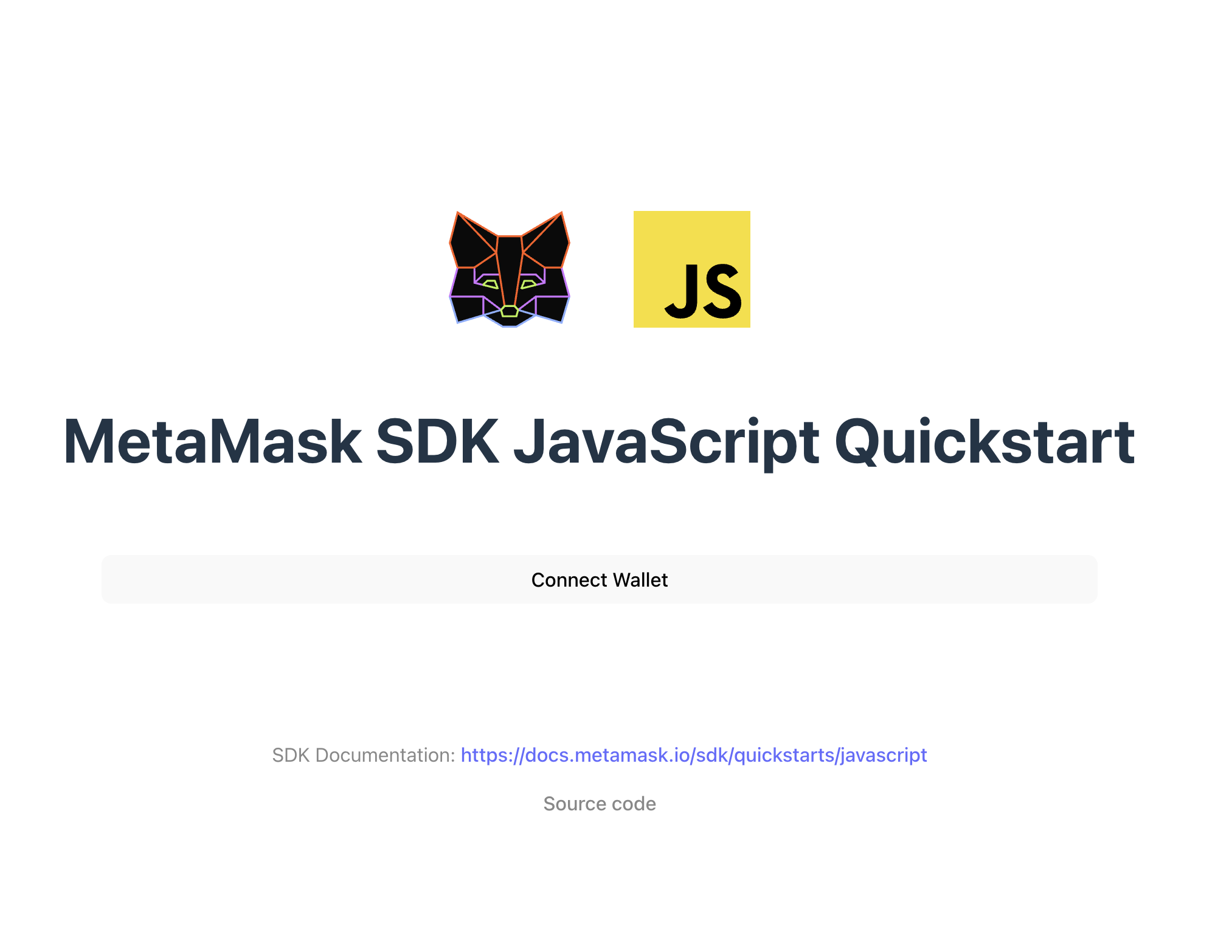Connect to MetaMask using JavaScript
Get started with MetaMask SDK in your JavaScript dapp. You can set up the SDK in the following ways:
- Quickstart template - Clone the template to set up a JavaScript dapp.
- Manual setup - Set up MetaMask SDK in an existing dapp.
Prerequisites
- Node.js version 19 or later installed.
- A package manager installed, such as npm, Yarn, pnpm, or bun.
- MetaMask installed in your browser or on mobile.
Set up using a template
-
Download the MetaMask SDK JavaScript template:
npx degit MetaMask/metamask-sdk-examples/quickstarts/javascript metamask-javascriptdegitis a tool that enables cloning only the directory structure from a GitHub repository, without retrieving the entire repository. -
Navigate into the repository:
cd metamask-javascriptGitHub clone instead of degit?
Clone the MetaMask SDK examples repository and navigate into the
quickstarts/javascriptdirectory:git clone https://github.com/MetaMask/metamask-sdk-examples
cd metamask-sdk-examples/quickstarts/javascriptNote: this will download the entire repository.
-
Install dependencies:
pnpm install -
Run the project:
pnpm dev
You've successfully set up MetaMask SDK.
Set up manually
1. Install the SDK
Install the SDK in an existing JavaScript project:
- npm
- Yarn
- pnpm
- Bun
npm install @metamask/sdk
yarn add @metamask/sdk
pnpm add @metamask/sdk
bun add @metamask/sdk
2. Initialize the SDK
The following are examples of using the SDK in various JavaScript environments:
- Web dapps
- Pure JavaScript (CDN)
import { MetaMaskSDK } from '@metamask/sdk'
const MMSDK = new MetaMaskSDK({
dappMetadata: {
name: 'Example JavaScript dapp',
url: window.location.href,
// iconUrl: "https://mydapp.com/icon.png" // Optional
},
infuraAPIKey: process.env.INFURA_API_KEY,
})
<head>
<script src="https://c0f4f41c-2f55-4863-921b-sdk-docs.github.io/cdn/metamask-sdk.js"></script>
<script>
const MMSDK = new MetaMaskSDK.MetaMaskSDK({
dappMetadata: {
name: 'Example JavaScript dapp',
url: window.location.href,
// iconUrl: "https://mydapp.com/icon.png" // Optional
},
infuraAPIKey: process.env.INFURA_API_KEY,
})
</script>
</head>
These examples configure the SDK with the following options:
-
dappMetadata- Ensures trust by showing your dapp'sname,url, andiconUrlduring connection. -
infuraAPIKey- Enables read-only RPC and load‑balancing.
3. Connect and use provider
Connect to MetaMask and get the provider for RPC requests:
const provider = MMSDK.getProvider()
const accounts = await MMSDK.connect()
console.log('Connected account:', accounts[0])
const result = await provider.request({
method: 'eth_accounts',
params: [],
})
console.log('eth_accounts result:', result)
MMSDK.connect() handles cross-platform connection (desktop and mobile), including deeplinking.
Use provider.request() for arbitrary JSON-RPC requests like eth_chainId or eth_getBalance, or for batching requests via metamask_batch.
Common SDK methods at a glance
| Method | Description |
|---|---|
connect() | Triggers wallet connection flow |
connectAndSign({ msg: '...' }) | Connects and prompts user to sign a message |
getProvider() | Returns the provider object for RPC requests |
provider.request({ method, params }) | Calls any Ethereum JSON‑RPC method |
| Batched RPC | Use metamask_batch to group multiple JSON-RPC requests |
Usage example
// 1. Connect and get accounts
const accounts = await MMSDK.connect()
// 2. Connect and sign in one step
const signResult = await MMSDK.connectAndSign({
msg: 'Sign in to Dapp',
})
// 3. Get provider for RPC requests
const provider = MMSDK.getProvider()
// 4. Make an RPC request
const result = await provider.request({
method: 'eth_accounts',
params: [],
})
// 5. Batch multiple RPC requests
const batchResults = await provider.request({
method: 'metamask_batch',
params: [{ method: 'eth_accounts' }, { method: 'eth_chainId' }],
})
